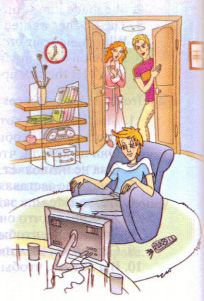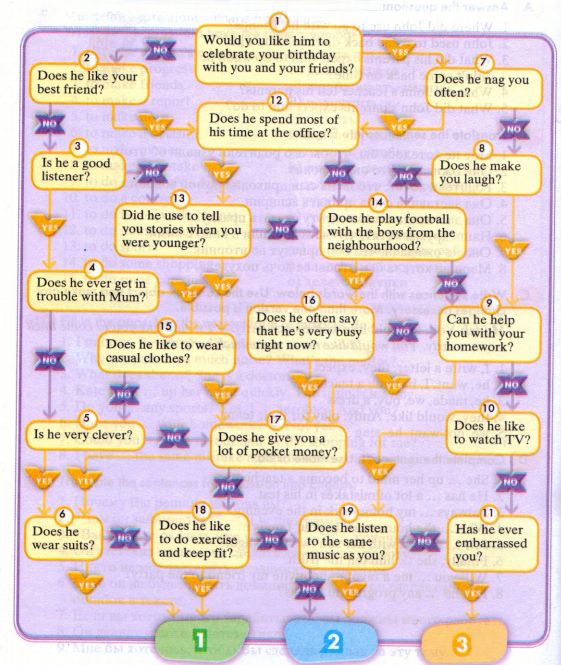|
Гипермаркет знаний>>Английский язык>>Английский язык 9 класс>> What do his parents want him to do

 Употребление сложного дополнения после глаголов to make (заставлять) и to let (позволять) Употребление сложного дополнения после глаголов to make (заставлять) и to let (позволять)
После этих глаголов инфинитив употребляется без частицы to.
She makes her son clean his room every day. — Она заставляет сына убирать комнату каждый день.
Don't let your daughter come home late.— He позволяйте Вашей дочери приходить поздно.
1 Translate the sentences into Russian.
1. Don't let him come to our house again.
2. She made her son tell the truth.
3.1 let her talk for about ten minutes.
4. You can't make me obey you!
5. The father didn't let his son drive his car.
6. "Will you let me say something now?" I asked.
7. She made him promise to come back.
2 Use the complex object with or without to.
1. We expect you... come to his birthday.
2. She made him... promise to give the picture to her.
3. The teacher wanted me... read this book.
4. Who made your brother... do it?
5. I wouldn't like my friends... see me now.
6. Don't let them... upset you so much.
3 Translate the sentences into English.
1. Мои родители хотят, чтобы я стал врачом.
2. Нина хочет, чтобы сын ее слушался.
3. Они не хотели, чтобы он узнал об этом.
4. Она не позволяет дочери приходить домой поздно.
5. Никто не заставлял его делать это.
6. Позвольте мне задать вопрос.
7. Я ожидала, что они приедут сегодня.
8. Лиз хотела, чтобы Майк встретил ее.
9. Сергей хотел, чтобы его друзья поняли его.
10. Вы хотите, чтобы я позвонил ей?
4 Listen to the conversation of Ex. 5 and say what's happened to John. Choose from the following.
1. John can't go out because his parents are very strict. They don't respect his freedom and they make him stay at home.
2. John used to go out a lot, but he can't now because he didn't warn his parents that he would be late, so they don't trust him anymore.
3. John can go to the disco only if he does all the chores and helps his parents do some housework.
5 Read the conversation for detail.
Mark: What happened here yesterday? Your brother John and your parents aren't talking to each other.
Emily: John wanted to go to the disco again.
Rob: What's wrong with that?
Emily: It's a long story. John is going to be fifteen this year and our parents used to let him go to the disco with his friends. Everything was OK until a month ago: John always came back on time and everybody was happy. A month ago John went to the disco as usual and promised to be home at ten o'clock. When he didn't come at ten, our parents expected him to phone and tell them what was going on, but he didn't phone. That night he came home at midnight and our parents were very upset. After that night they warned John not to do it again and our parents let him go back to the disco. But then he was late again and once again he didn't phone. A couple of days later John's teacher asked our parents to come to the school. He told Mom and Dad that John had been getting a lot of bad marks in the last few months. Our parents wanted John to explain everything and asked him a lot of questions, but he refused to answer them. Since then our parents haven't let him go out, and every Friday when his friends go to the disco and have fun, he has to stay at home and watch TV.
Rob: That's really not fair!
Misha: They make a fifteen-year-old stay at home! They don't have much respect for him!
Mark: I don't agree with you. John's parents trusted him and he let them down. It's his own fault.

6 Who is saying these words? Replace the pronouns with the correct speakers.
1. They used to let him go to the disco with his friends.
2. They expected him to phone and warn them that he would be late.
3. They let him go to the disco again.
4. He told them that that John had been getting a lot of bad marks in the last few months.
5. They wanted him to explain his behaviour.
6. Since then our parents haven't let him go out.
7 Reread the conversation and find all the sentences with the complex object.
8 What do you think? Choose the correct answers. Discuss and support your position with sentences from the dialogue in Ex. 5 and from your own experience.
1. John's parents and John aren't talking to each other because
a) his parents are angry with John,
b) his parents didn't let John go to the disco,
c) his parents don't understand John.
2. John's parents were upset because
a) John came home late,
b) John went to the disco,
c) John hadn't phoned.
3. John's parents don't let John go to the disco anymore because
a) he has come home late twice,
b) he had been getting bad marks in the last few months,
c) they can't trust him anymore.
4. John doesn't want to explain anything because
a) he thinks that his parents won't understand him.
b) he thinks that his parents won't like his explanation,
c) he thinks that his parents don't respect him.
How to build words
What are the most important things for you in your relationship with your parents?
Form the necessary nouns from these words. Use the suffixes: -ship, -ness, -merit -hood, -ing, -dom, -ment or conversion.
friend, wise, happy, trust, kind, understand, help, love, free, fair, agree, close, forgive, polite
Verb activator
The verbs to make and to do
9 Match the expressions with the translations. Which two expressions have the same meaning?
1. to make up one's mind а) делать доклад
2. to make progress b) делать успехи
3. to make friends с) зарабатывать деньги
4. to make a report d) подружиться
5. to make noise е) шуметь
6. to make a decision f) принять решение
7. to make money g) сделать ошибку
8. to make a mistake h) принять решение
9. to do somebody a favour i) делать кому-то одолжение
10. to do a course j) учиться
11. to do housework, chores к)готовить
12. to do homework l) делать работу по дому
13. to do sports m) делать домашнюю работу
14. to do some shopping n) заниматься спортом
15. to do some cooking о)делать покупки
10 Fill in the gaps. Use the correct form of make or do.
1. I'm busy. Tomorrow I'm going to ... a report.
2. Why are you ... so much noise? What's the matter?
3. What does she ...? She is a doctor.
4. Kate must ... up her mind quickly. The train is leaving.
5. Do you ... any sports? Yes, I ... aerobics. And you?
6. Have you ... your homework? — Not yet.
7. Could you ... me a favour and ... the shopping for me?
8. I have ... the same mistake again. Mom is going to nag me for a week!
11 Translate the sentences from Russian into English.
1. Почему Вы решили помочь им?
2. "Чем он занимается?" — "Он программист".
3. "Вы можете оказать мне услугу?" — "Да, конечно".
4. Он заставил свою дочь сделать домашнюю работу.
5. Никто не мог заставить ее заниматься спортом.
6. Если он не будет делать домашнюю работу, он сделает много ошибок в тексте.
7. Если вы хотите много зарабатывать, вы должны много работать.
8. Он делает успехи в математике.
9. Мне бы хотелось, чтобы Вы сделали доклад на эту тему.
Homework
A Answer the questions about the dialogue from Ex. 5.
1. Where did John use to go with his friends?
2. John used to come back on time, didn't he?
3. What did his parents expect him to do when he didn't come back on time?
4. What did John's teacher tell his parents?
5. What did John's parents expect him to do?

В Translate the sentences into English.
1. Мне не хотелось бы, чтобы его родители узнали об этом.
2. Они ожидали, что он позвонит.
3. Родители хотят, чтобы их сын приходил домой вовремя.
4. Она заставила сына принять аспирин.
5. Она заставила свою подругу сказать правду.
6. Наши друзья хотят, чтобы мы пошли в кино с ними.
7. Она не ожидала, что они приедут во вторник.
8. Мэри не хотела бы, чтобы ее дочь похудела.
С Write sentences with the words below. Use the complex object and make any changes necessary. More than one version is possible.
Model:You, I, would like, come back early. — I would like you to come back
early. You would like me to come back early.
1. I, write a letter, they, expect
2. he, want, I, become a teacher
3. he, made, we, buy, a dress
4. they, would like, Andy, play for their team
5. we, not want, he, sing
D Complete the sentences. Use make or do.
1. She ... up her mind to become a teacher.
2. He has ... a lot of mistakes in his test.
3. I always ... my homework in the evening.
4. Who ... the housework in your family?
5. Jeff ... friends with her son two years ago.
6. Finally, she ... him tell the truth.
7. Will you ... me a favour and invite my friend to the party?
8. Has he ... any progress in Maths?
E Follow the flow chart and find out more about your relationship with your father. Is he like Carlson who lives on the roof, Gena the crocodile or Matroskin the cat? See your results on page 1 34.

К. И. Кауфман, М. Ю. Кауфман Английский язык: Счастливый английский.ру / Happy English.ru: Учебник англ. яз. для 9 кл. общеобраз. учрежд.— Обнинск: Титул, 2008.— 288 с: ил.
Рефераты, домашняя работа по английскому языку скачать, учебники скатать бесплатно, онлайн уроки, вопросы и ответы
Содержание урока
 конспект урока конспект урока
 опорный каркас опорный каркас
 презентация урока презентация урока
 акселеративные методы акселеративные методы
 интерактивные технологии
Практика интерактивные технологии
Практика
 задачи и упражнения задачи и упражнения
 самопроверка самопроверка
 практикумы, тренинги, кейсы, квесты практикумы, тренинги, кейсы, квесты
 домашние задания домашние задания
 дискуссионные вопросы дискуссионные вопросы
 риторические вопросы от учеников
Иллюстрации риторические вопросы от учеников
Иллюстрации
 аудио-, видеоклипы и мультимедиа аудио-, видеоклипы и мультимедиа
 фотографии, картинки фотографии, картинки
 графики, таблицы, схемы графики, таблицы, схемы
 юмор, анекдоты, приколы, комиксы юмор, анекдоты, приколы, комиксы
 притчи, поговорки, кроссворды, цитаты
Дополнения притчи, поговорки, кроссворды, цитаты
Дополнения
 рефераты рефераты
 статьи статьи
 фишки для любознательных фишки для любознательных
 шпаргалки шпаргалки
 учебники основные и дополнительные учебники основные и дополнительные
 словарь терминов словарь терминов
 прочие
Совершенствование учебников и уроков прочие
Совершенствование учебников и уроков
 исправление ошибок в учебнике исправление ошибок в учебнике
 обновление фрагмента в учебнике обновление фрагмента в учебнике
 элементы новаторства на уроке элементы новаторства на уроке
 замена устаревших знаний новыми
Только для учителей замена устаревших знаний новыми
Только для учителей
 идеальные уроки идеальные уроки
 календарный план на год календарный план на год
 методические рекомендации методические рекомендации
 программы программы
 обсуждения
Интегрированные уроки обсуждения
Интегрированные уроки
Если у вас есть исправления или предложения к данному уроку, напишите нам.
Если вы хотите увидеть другие корректировки и пожелания к урокам, смотрите здесь - Образовательный форум.
|













